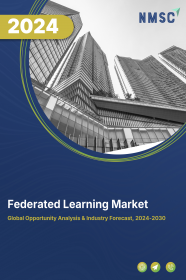
Federated Learning Market by Deployment (Cloud and On-Premise), by Application (Industrial Internet of Things, Drug Discovery, Risk Management, Augmented & Virtual Reality, Data Privacy Management, Visual Object Detection, and Others), and by Industry Vertical (Healthcare & Life Science, BFSI, Manufacturing, Automotive & Transportation, and Energy & Utilities)- Global Opportunity Analysis and Industry Forecast 2024-2030
Market Definition
The Federated Learning Market size was valued at USD 131.36 million in 2023 and is predicted to reach USD 264.24 million by 2030 with a CAGR of 10.5% from 2024-2030.
Federated learning is a type of machine learning that allows multiple devices to collaboratively train a model without having to share their data with each other or with a central server. Instead, the model is trained locally on each device using its own data, and then the updated model parameters are sent to a central server, where they are aggregated and used to improve the overall model. Federated learning also enables models to be trained on data that is distributed across multiple devices or locations, which can be more efficient and cost-effective than centralizing the data.
Market Dynamics and Trends
The demand for federated learning is increasing due to the growing adoption of smart devices such as smartphones, laptops, and tablets. The proliferation of these devices has enabled organizations to access the data stored on them, resulting in the growing demand for federated learning.
Also, the increasing demand for edge computing is driving the growth of the federated learning market. Edge computing helps organizations to store, process, and analyze data at the edge of the network. This helps to reduce the latency associated with transferring data to the cloud.
Moreover, the growing adoption of federated learning in regulated industries such as healthcare and finance to leverage data for model training while complying with strict regulations regarding data privacy and security, boosts market expansion. By keeping sensitive data decentralized, organizations can ensure compliance with regulations while still benefiting from machine learning insights.
However, lack of skilled IT professionals to operate federated learning systems restrains the growth of federated learning market. On the other hand, the introduction of federated learning module such as ‘Elix Mila’ for AI drug discovery is expected to create ample growth opportunities for the federated learning market. This development supports advanced models with a wide range of applications and can securely access vast amounts of data for learning, expected to be widely adopted by pharmaceutical and chemical companies in the future.
Market Segmentation and Scope of Study
The global federated learning market is segmented on the basis of deployment, application, industry vertical and geography. Based on deployment the market is classified into, cloud and on-premise. Based on application, the market is classified into Industrial internet of things, drug discovery, risk management, augmented & virtual reality, data privacy management, visual object detection, and others. Based on the industry vertical, the market is segmented into healthcare & life science, BFSI, manufacturing, automotive & transportation, and energy & utilities. Geographical breakdown and analysis of each of the aforesaid classifications include regions comprising of North America, Europe, Asia-Pacific, and RoW.
Geographical Analysis
Europe dominates the global federated learning market and is potently expected to remain dominant in the market throughout the forecast period. This is attributed to the rising government investments in research and development (R&D) activities, particularly in the field of medicine, are playing a pivotal role in driving the growth of the federated learning market.
For example, in July 2022, the European Union partnered with EFPIA companies to invest in a healthcare project focused on federated learning in drug discovery. This collaboration underscores a concerted effort to leverage federated learning techniques for enhancing pharmaceutical research and development processes.
With federated learning's ability to facilitate collaborative model training while preserving data privacy, it presents a promising solution for accelerating drug discovery efforts. Moreover, government initiatives aimed at fostering the development of the augmented and virtual reality (AR/VR) industry are directly contributing to the growth of the federated learning market.
For instance, the European Union's proactive measures, such as the pilot project 'Understanding the value of a European gaming society' initiated by the European Parliament in September 2022, demonstrate a concerted effort to cultivate the AR/VR sector.
By establishing a European network comprising experts, thinkers, and leaders to formulate a framework for gaming, these initiatives create a fertile ground for technological advancements. Federated learning, with its potential to enhance data privacy and model performance in AR/VR applications, stands to benefit significantly from such supportive environments, thus experiencing a corresponding surge in market demand and adoption.
On the other hand, North America shows a substantial growth in the global federated learning market owing to the increasing adoption of federated learning technology within the healthcare sector. Federated learning is being utilized extensively in healthcare to develop predictive models for medical outcomes, assist in disease diagnosis, and recommend treatment strategies.
A notable example of this trend is exemplified by NVIDIA's launch of NVIDIA FLARE in November 2022. NVIDIA FLARE is an open-source platform specifically designed for biomedical imagery, functional genomics, cancer research, and COVID-19 research.
This platform integrates seamlessly with existing AI initiatives, such as the MONAI framework for medical imaging. By providing a robust solution tailored to the unique needs of the healthcare industry, NVIDIA FLARE and similar initiatives are driving the adoption of federated learning technologies in North America's healthcare sector. Consequently, this surge in adoption is fueling the overall growth of the federated learning market in the region.
Competitive Landscape
The federated learning market includes several market players such as NVIDIA Corporation, Cloudera Inc, IBM Corporation, Microsoft Corporation, Google LLC, Intel Corporation, Owkin, Intellegens, Edge Delta Inc., and Enveil among others. These market players are adopting various strategies such as innovation and product launches, and collaboration to maintain their dominance in the global federated learning market.
For instance, in November 2021, Google AI announced the improvement of Smart Text Selection by using federated learning to train the neural network model on user interactions responsibly while preserving user privacy.
Moreover, in June 2022, Microsoft Research launched Federated Learning Utilities and Tools for Experimentation (FLUTE), a framework designed for conducting large-scale offline federated learning simulations. FLUTE's objective is to create a high-performance simulation platform facilitating rapid prototyping of federated learning research and simplifying the implementation of federated learning applications.
Furthermore, in November 2021, Google integrated federated learning into its Smart Text Selection feature. This introduction aimed to streamline the training of neural network models by incorporating user interactions, enhancing both reliability and user privacy. Moreover, the update introduced improvements allowing models to be trained directly on user devices using real interactions, leveraging federated learning techniques.
Key Benefits
-
The report provides quantitative analysis and estimations of the federated learning market from 2024 to 2030, which assists in identifying the prevailing market opportunities.
-
The study comprises a deep dive analysis of the federated learning market including the current and future trends to depict prevalent investment pockets in the market.
-
Information related to key drivers, restraints, and opportunities and their impact on the federated learning market is provided in the report.
-
Competitive analysis of the players, along with their market share is provided in the report.
-
SWOT analysis and Porters Five Forces model is elaborated in the study.
-
Value chain analysis in the market study provides a clear picture of the roles of stakeholders.
Key Market Segments
By Deployment
-
Cloud
-
On-Premise
By Application
-
Industrial Internet of Things
-
Drug Discovery
-
Risk Management
-
Augmented & Virtual Reality
-
Data Privacy Management
-
Visual Object Detection
-
Others
By Industry Vertical
-
Healthcare & Life Science
-
BFSI
-
Manufacturing
-
Automotive & Transportation
-
Energy & Utilities
By Geography
-
North America
-
The U.S.
-
Canada
-
Mexico
-
-
Europe
-
The UK
-
Germany
-
France
-
Italy
-
Spain
-
Denmark
-
Netherlands
-
Finland
-
Sweden
-
Norway
-
Russia
-
Rest of Europe
-
-
Asia Pacific
-
China
-
Japan
-
India
-
South Korea
-
Australia
-
Indonesia
-
Singapore
-
Taiwan
-
Thailand
-
Rest of Asia Pacific
-
-
RoW
-
Latin America
-
Middle East
-
Africa
-
Key Players
-
NVIDIA Corporation
-
Cloudera Inc.
-
IBM Corporation
-
Microsoft Corporation
-
Google LLC
-
Intel Corporation
-
Owkin
-
Intellegens
-
Edge Delta Inc.
-
Enveil
REPORT SCOPE AND SEGMENTATION:
|
Parameters |
Details |
|
Market Size in 2023 |
USD 131.36 Million |
|
Revenue Forecast in 2030 |
USD 264.24 Million |
|
Growth Rate |
CAGR of 10.5% from 2024 to 2030 |
|
Analysis Period |
2023–2030 |
|
Base Year Considered |
2023 |
|
Forecast Period |
2024–2030 |
|
Market Size Estimation |
Million (USD) |
|
Growth Factors |
|
|
Countries Covered |
28 |
|
Companies Profiled |
10 |
|
Market Share |
Available for 10 companies |
|
Customization Scope |
Free customization (equivalent up to 80 working hours of analysts) after purchase. Addition or alteration to country, regional, and segment scope. |
|
Pricing and Purchase Options |
Avail customized purchase options to meet your exact research needs. |




















 Speak to Our Analyst
Speak to Our Analyst
























